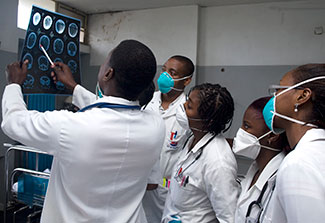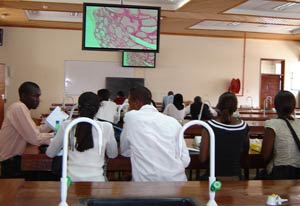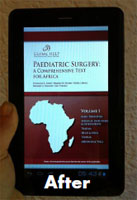Africa’s health, research workforce gets $26M boost
September / October 2018 | Volume 17, Number 5

Photo by Richard Lord for Fogarty/NIH
A new program administered by Fogarty will provide
$22 million to improve health care workforce capacity
in sub-Saharan Africa.
$22 million to improve health care workforce capacity
in sub-Saharan Africa.
To further strengthen the health care and research workforce in sub-Saharan Africa (SSA), Fogarty is planning to award about $22 million over five years, through a new program funded by the President’s Emergency Plan for AIDS Relief (PEPFAR). The seven projects being supported by the Health Professional Education Partnership Initiative (HEPI) are intended to leverage the achievements and lessons learned from the previous Medical Education Partnership Initiative (MEPI) and Nursing Education Partnership Initiative (NEPI) .
A related award will provide nearly $4 million over five years to fund the African Forum for Research and Education in Health (AFREhealth), which will serve as a leadership and convening organization to network institutions to develop and share innovations, curricula and policy.
“Through this new program called HEPI, we are empowering African institutions to tackle the region’s most pressing health problems, improve the effectiveness and efficiency of the U.S. response to HIV/AIDS, and reduce the suffering and death the epidemic continues to cause across the region,” said Fogarty Director Dr. Roger I. Glass.

Photo courtesy of Dr. James Kiarie, MEPI Kenya
The Health Education Partnership Initiative (HEPI) will
strengthen innovative training approaches, including
e-learning curricula.
strengthen innovative training approaches, including
e-learning curricula.
The overarching goal of the initiative is to encourage activities that prepare an African workforce capable of meeting the biomedical, behavioral and clinical research needs in PEPFAR-priority countries with a high burden of HIV/AIDS. Grantee institutions are being supported to expand and enhance innovative education models, evaluate and disseminate best educational practices, introduce and test innovative training approaches including interprofessional education activities, and enhance opportunities for students to conduct locally relevant research as an integral part of their professional training. In addition, HEPI participants will develop strategies to recruit and retain qualified faculty, combat brain drain of trainees, increase the number of health professionals in neglected rural areas, and build the human and organizational resources to support research at the institutions. Finally, grantees will consult with stakeholders such as the Ministries of Health and Education to ensure national workforce needs are being met, and form partnerships to strengthen national networks of African health education and research institutions.
The companion Association award will provide leadership for institutions across Africa, and act as a hub to support joint educational activities with a focus on outreach to broad communities and multiple stakeholders. These may involve holding an annual symposium, establishing topical working groups, conducting mentoring activities and developing curricula.


Photos courtesy of MEPI Ethiopia
HEPI will build on progress made under the previous
MEPI program, which helped Africa's medical schools
move from hard copy textbooks to tablets that provide
access to the latest information.
MEPI program, which helped Africa's medical schools
move from hard copy textbooks to tablets that provide
access to the latest information.
HEPI will build on framework developed through the prior MEPI/NEPI programs. Some key accomplishments included forming a network of more than 60 African medical schools, establishing dedicated offices for grant writing and management, upgrading rural training sites, promoting interdisciplinary education and incorporating research into academic training. In addition, new electronic educational practices were developed, broadband access was enhanced across campuses, e-learning materials were developed and shared, skills labs were established to provide training in procedures, and tablets were provided so students could access current health information. Also, a Principal Investigator council was formed to manage and coordinate activities among participants.
HEPI is administered by Fogarty and funded by PEPFAR, the U.S. response to the global HIV/AIDS epidemic. Begun 15 years ago, PEPFAR now has activities in 50 countries and supports over 14 million men, women and children on HIV treatment.
NIH's National Institute of Nursing Research (NINR) is a partner on the project.
Health Professional Education Partnership Initiative (HEPI) Awards
- Ethiopia: Health Professionals Education Partnership Initiative EthiopiaAddis Ababa University
with Emory University, University of Alabama, Wolaita Sodo University and Dilla University
Principal investigator: Dr. Miliard Derbew - Kenya: Health-Professional Education Partnership Initiative (HEPI) - Kenya
University of Nairobiwith University of Washington, Maseno University, Kenyatta University, Jomo Kenyatta University of Agriculture and Technology and Stanford University
Principal investigators: Drs Dalton Chekoko Wamalwa and Ruth Wanjiru Nduati - Mozambique: The University Eduardo Mondlane/UCSD Health-Professional Education Partnership Initiative
Eduardo Mondlane University
with Mozambique Institute for Health Education and Research - (MIHER), University of California, San Diego and Universidade Pedagogica
Principal investigator: Dr. Emilia Virginia Noormahomed - Tanzania: To Reach the People: Transforming Health Professions Education In Tanzania (THET)
Muhimbili University/Allied Health Sciences
with University of California, San Francisco, Duke University, Catholic University of Health and Allied Sciences and Kilimanjaro Christian Medical College
Principal investigator: Dr. Ephata E. Kaaya - Uganda: Health Professions Education and Training for Strengthening the Health System and Services in Uganda
Makerere University
with Yale University, Johns Hopkins University and Busitema University
Principal investigator: Dr. Sarah Kiguli - Uganda: Health-Professional Education Partnership Initiative - Transforming Ugandan Institutions Training Against HIV/AIDS (HEPI-TUITAH)
Mbarara University of Science and Technology
with Massachusetts General Hospital, Bishop Stuart University and Lira University
Principal investigator: Dr. Celestino Obua - Zimbabwe: Partnership in Education Training and Research Advancement (PETRA)
College of Health Sciences, University of Zimbabwe
with Africa University, Midlands State University, National University of Science and Technology and Stanford University
Principal investigator: Dr. James Gita Hakim
African Association for Health Professions Education and Research Award
- African Association for Health Professions Education and Research
Makerere University College of Health Sciences
with University of Ibadan, University of KwaZulu-Natal and Stellenbosch University
Principal investigators: Drs. Nelson K. Sewankambo, Prisca Adejumo, Jean Bisimwa Nachega and Fatima Suleman





















.png)









No hay comentarios:
Publicar un comentario